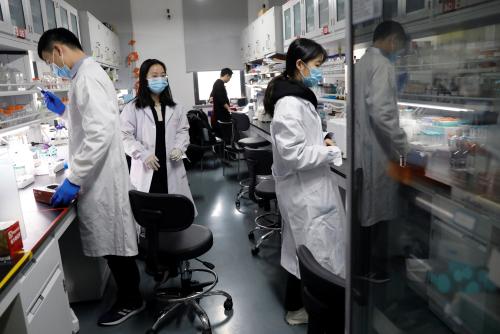Over the past decade, regional organizations around the world have been devoting increased attention to the problem of internal displacement. There is good reason for their involvement. Situations of conflict and displacement rarely remain confined within borders. They spill over into neighboring countries and can upset regional stability, thereby often compelling a regional response.
The efforts of regional organizations have been encouraged by the United Nations. UN resolutions of the General Assembly and the Commission on Human Rights have called upon regional bodies to expand their cooperation with the Representative of the Secretary-General on Internally Displaced Persons and strengthen their activities with regard to internal displacement. In particular, these resolutions have called upon regional organizations and the Representative to convene seminars on the Guiding Principles on Internal Displacement.
In response, regional organizations have been strengthening their ties with the Representative and have begun to disseminate and use the Guiding Principles. In holding the IOM/ECOWAS International Workshop on Migration in West Africa, ECOWAS has indicated its interest in examining the role that it can play in addressing situations of forced displacement. It may therefore prove instructive to take a brief look at some of the activities of other regional organizations since they may be pertinent to ECOWAS and the West African region.
One institutional response that will be of interest to ECOWAS can be found in the Americas. The Organization of American States (OAS) appointed a focal point for internal displacement in 1996. Its Inter-American Commission on Human Rights, a body of experts, made one of its members a Special Rapporteur for internally displaced persons “in recognition of the grave situation of internally displaced persons in several countries of the Hemisphere.” Because of this appointment, the Inter-American Commission has undertaken more systematic reporting of the situation of internally displaced persons in the Western Hemisphere. For example, its 1999 report on Colombia, a country beset by civil war, contained a lengthy chapter on the internally displaced, with recommendations addressed both to the government and also to insurgent groups to improve their conditions.
In addition in 1998, the Inter-American Commission formally endorsed the Guiding Principles on Internal Displacement as an authoritative guide to applicable international law. It now uses them as a checklist for evaluating conditions in different countries.
The Commission has also made important decisions affecting the internally displaced. In the case of Nicaragua, for example, it ruled that compensation should be awarded to the Miskito Indians for the damage done to their property during their internal displacement. This decision helped shape future approaches to the issue of compensation, both in the Americas and elsewhere.
Turning to Europe, the Organization for Security and Cooperation in Europe (OSCE), in September 2000, devoted an all-day meeting to migration and internal displacement in order to identify ways in which OSCE institutions, field operations and participating states could enhance their response to internal displacement. That same year, the OSCE Chair outlined areas in which the OSCE could make a contribution. Of particular relevance to ECOWAS is the recommendation that OSCE staff begin to monitor and report on affected populations, provide advice to governments on national laws and best practices, and disseminate the Guiding Principles within the region and use them in the activities of the organization.
It should be noted too that OSCE engagement with the internally displaced includes direct involvement in protection activities on the ground. Unlike most regional bodies, OSCE deploys staff to the field for long periods to ease local tensions, encourage dialogue and reconciliation, and facilitate returns of displaced populations. With regard to returns, it has in particular sought to ensure the implementation of property laws and to promote the removal of administrative and legal barriers. Indeed, OSCE member states have committed themselves to facilitate the voluntary return of refugees and internally displaced persons in dignity and safety and their reintegration without discrimination.
Another important area of OSCE’s work is election monitoring, which includes efforts to ensure that the political rights of internally displaced persons are respected.
A second European regional organization, the European Union, has played a significant political role in the prevention of conflicts that produce mass displacement and also is a leading donor of humanitarian assistance. Its current plans for the creation of a rapid reaction force to respond to regional and international crises should have impact on the protection of internally displaced persons.
Still another European regional organization, the Council of Europe, whose main focus is human rights, undertakes fact-finding missions to areas of displacement, publishes reports, adopts resolutions, and deploys experts to the field. Most recently, the Council of Europe took a step that will be of interest to ECOWAS. It appointed a rapporteur on internal displacement in Europe to collect data and report on the conditions of the estimated 4 million displaced persons on the continent.
With regard to Africa, the Organization of African Unity (OAU), now renamed the African Union (AU), has held a series of widely attended meetings on internal displacement, designed to make its member states more aware of and more involved in resolving the problem. In 1994, the OAU Commission on Human and Peoples’ Rights held a seminar on the protection of African refugees and internally displaced persons. That same year the OAU together with the United Nations High Commissioner for Refugees (UNHCR) organized a regional symposium on refugees and forced population displacements. Both meetings recommended greater OAU involvement in addressing internal displacement, in tackling its root causes, and in forging stronger linkages between conflict resolution activities and programs on behalf of refugees and internally displaced persons. Subsequently, in 1996, the OAU co-sponsored a regional conference with UNHCR on displacement in the Great Lakes region of Africa. And in 1998, in collaboration with our Project and UNHCR, the OAU cosponsored a workshop in Addis Ababa on internal displacement in Africa to promote more effective strategies for protecting and assisting internally displaced persons. Of particular interest to ECOWAS is that the workshop recommended that the OAU establish a focal point on internal displacement to collect data on the problem and monitor, disseminate and implement the Guiding Principles. Although OAU staff expressed interest in a focal point, limited resources have been a prohibitive factor.
OAU meetings, I would note, have also paid special attention to the gender dimension of internal displacement. Since women and children constitute the vast majority of the displaced, focusing on their specific needs is essential. The first such meeting was held in 1995 and concentrated on the legal status of refugee and internally displaced women in Africa and called for stronger legal protections for them. The second OAU meeting, held in 1998, focused on the needs of internally displaced women and children during return and reintegration.
Over the past few years, the OAU Commission on Refugees, Returnees and Displaced Persons has also begun to monitor conditions of internally displaced persons in its visits to different countries. In 1999, it formally acknowledged with appreciation the Guiding Principles on Internal Displacement. And the “Compendium of OAU Instruments and Texts on Refugees, Returnees and Displaced Persons in Africa,” published in 2000, includes the text of the Guiding Principles.
To anticipate and defuse the conflicts that cause mass displacement and encourage the return of refugees and displaced persons, the OAU, like its counterparts in Europe, set up a mechanism for conflict prevention, management and resolution.
Sub-regional organizations in Africa have also been devoting increased attention to internal displacement. The Inter-Governmental Authority on Development (IGAD) will be holding a seminar at the end of October on internal displacement in that region in cooperation with the Office of the Representative of the Secretary-General and the UN Office for the Coordination of Humanitarian Affairs. As for ECOWAS, I would recall that it has positively received the Guiding Principles on Internal Displacement. In April 2000, Foreign and other senior Ministers of the organization, at a Conference on War-Affected Children in West Africa, adopted a declaration welcoming the Guiding Principles on Internal Displacement and calling for their application by ECOWAS member states. This declaration was subsequently adopted at the ECOWAS Summit of Authority of Heads of State and Government held in Bamako in December 2000. ECOWAS’ recent creation of a conflict prevention and management mechanism and its plans to establish a department of humanitarian affairs should further enhance its role with regard to situations of internal displacement. Through its military arm, ECOMOG, the organization has also become involved in efforts on the ground to create security for civilian populations, including the internally displaced. At the same time, it has been acknowledged by member states that ECOMOG forces, like all other peacekeepers, could benefit from training in human rights and humanitarian law, which encompasses the protection of displaced populations.
In conclusion, there are many steps that regional bodies can take to make their own roles more effective in situations of internal displacement. From the various activities I have described, the following five steps might be of particular interest and relevance to ECOWAS at this time:
- The appointment of a focal point on migration, including internal displacement. The focal point could collect data, monitor and report on new and protracted situations of internal displacement in addition to other migration issues and work together with governments to find national and regional solutions. Focal points, I would note, can be appointed in a voluntary capacity when resources are limited. For example, the rapporteurs of the Council of Europe and Organization of American States both serve in a voluntary capacity.
- The promotion and dissemination of the Guiding Principles on Internal Displacement, including encouraging their use by member states as a guideline and yardstick for measuring conditions on the ground, collecting data and as a framework for policies.
- Working together with ECOWAS member states to ensure that their constitutions, laws and national institutions address the subject of forced migration. To this end, the drafting of a model law on internal displacement might prove useful. If it would be of assistance, the Office of the Representative could collaborate with ECOWAS on such an initiative.
- The training of judges, lawyers, government officials and other relevant persons, including peacekeepers, in the protection measures set forth in the Guiding Principles. Once again, the Office of the Representative of the Secretary-General could be helpful in this regard. And,
- The integration of internal displacement into all relevant programs, seminars and activities of the organization.
ECOWAS’ ability to integrate the issue of internal displacement into its work could help its member states better fulfill their own commitments to displaced populations. The scale and severity of the problem in the West African region make it important for systematic attention to be given to the plight of the internally displaced. It would seem not only to be the right thing to do but also should be done to assure this region’s collective peace and prosperity.


Commentary
The Role of Regional Organizations, ECOWAS
September 30, 2002